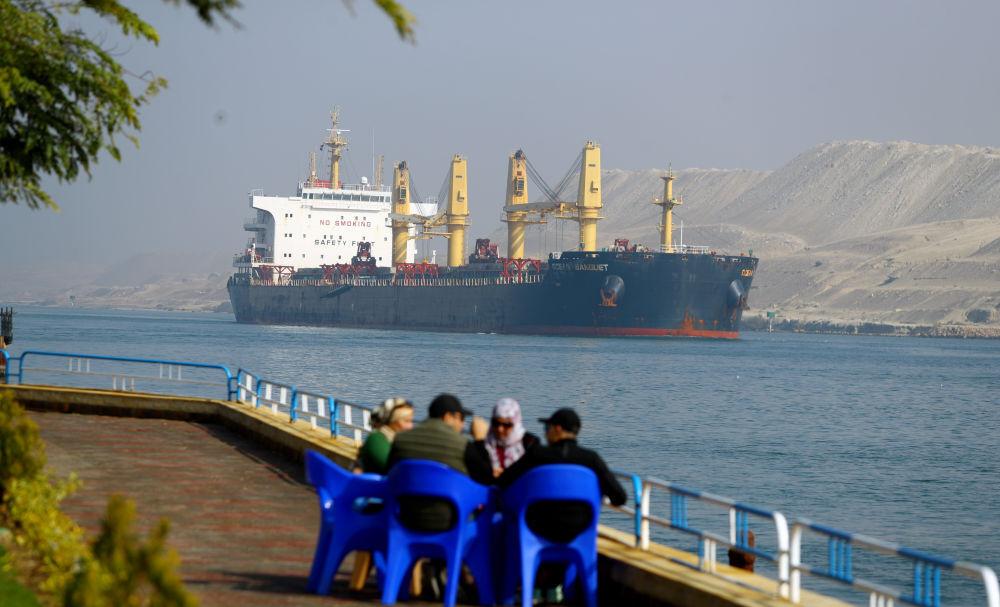The global shipping giant announced the suspension of sailings, and just announced its return to the Red Sea a week ago
Edited by: Bi Luming
In recent weeks, attacks on merchant ships in the Middle East have exacerbated the turmoil in the Middle East.
According to the Economic Information Daily on January 3, 2024, citing Reuters, on December 31, 2023 local time, the global shipping giant Maersk Line Group issued a statement confirming that one of the company's cargo ships was attacked by armed men in the waters of the Red Sea, and will again suspend the passage of all its cargo ships through the Red Sea in the next 48 hours. A week ago, Maersk thought the situation had eased and said it was arranging for dozens of its ships to return to the Red Sea.

Image source: Xinhua News Agency
In an update to customers, Maersk wrote, "We have decided to suspend all routes through the Red Sea/Gulf of Aden until further notice. Two days ago, the company suspended all vessel passages through the Red Sea for 48 hours after the Maersk "Hangzhou" was attacked twice while sailing north in the southern Red Sea. In terms of the market, at the opening of trading on January 3, 2024, the main contract of the container transportation index (European line) rose by 23%, and is now at 2353.9 points.
In order to avoid risks, many international shipping companies have made the decision to suspend sailings or detour voyages. Maersk first announced a moratorium on sailing in the Red Sea, and since then plans to detour Africa via the Cape of Good Hope for all ships that have suspended sailings and pass through the Red Sea region. The Suez Canal, the Red Sea, is the main international shipping route from Asia to the Mediterranean Sea and Europe. Generally, the Asia-Europe route, especially the Europe-China route, mainly takes the Red Sea channel, which is the main channel for Asia-Europe maritime trade.
According to a Reuters report quoted by the Taiwan Strait Network on January 3, some analysts pointed out that if the crisis spills over further, shipowners may only have to wait in line for Panama to open navigation or bypass the Cape of Good Hope. Clarkson Securities analysts believe that the current share prices of crude oil and product tankers do not yet reflect the disturbance of the situation in the Red Sea, and if the Suez Canal is completely closed, the market freight rate of clean tankers may increase by 12%. Theoretically, the Suezmax freight rate could soar to around $200,000 per day as a result.
According to the Wall Street Journal, Maersk, one of the world's largest shipping companies, recently announced plans to lay off more than 10,000 employees, and predicts that full-year profits in 2023 will be at the lower end of the target range. The U.S. Consumer News & Business Channel reported that the latest survey results show that the global freight industry will experience a cold winter in 2023 and the industry will continue to face a challenging economic environment in 2024. Experts say that weak demand growth, low freight prices, and poor market expectations are the common characteristics of the entire industry at present.
According to a report by the Securities Times in December 2023, "If this round of Red Sea events is to have a lasting impact, we believe that the 'delay' will take a long time for the liner company to make a decision to detour to Europe." If this happens, the high price of shipping can be maintained. Gao Cong, a researcher at Huatai Futures, said that the sharp rise in shipping prices is due to the poor passage of the Red Sea, which has triggered the market expectation of increasing the cost of deflection and reducing the effective capacity, and the subsequent news related to the resolution of the Red Sea crisis will amplify market volatility.
Nomura Securities analysis report believes that abandoning the Red Sea-Suez route and detouring to the Cape of Good Hope will lead to a significant increase in shipping distances and costs, and the capacity of the Asia-Europe route will also be sharply reduced, bringing the risk of global inflation reheating. The severity of the current situation may be similar to the supply chain disruptions from 2020 to 2022, and the "detour to the Cape of Good Hope" will last for at least one month, even if the price of sea freight on the Asia-Europe route more than doubles.
In the face of the rapid rise in market prices, some analysts reminded investors to pay close attention to the changes in the situation in the Red Sea, and pay attention to the risk of premium taking once the overheating of the market subsided. In terms of strategy, short-term long orders should be held cautiously, pay attention to the trading rhythm and risk control, and continue to observe the supply and demand of fundamentals in the later January price increase.
Yan Lili of the Xinhu Futures Institute believes that if the Red Sea security crisis is perceived as a threat to shipping in the nearby Arabian Sea, the economic cost will be even greater, as one-third of the world's seaborne oil passes through the Arabian Sea. In the first half of 2023, total oil shipments through these routes accounted for about 12% of total seaborne oil trade, and total liquefied natural gas (LNG) shipments accounted for about 8% of total global LNG trade.
Daily Economic News, Comprehensive Economic Information Daily, Securities Times
(Disclaimer: The content and data in this article are for reference only and do not constitute investment advice. Do so at your own risk. )
National Business Daily